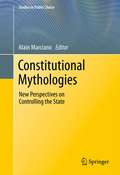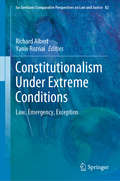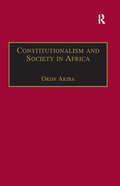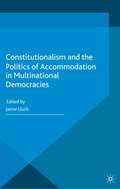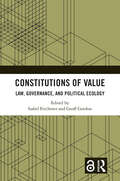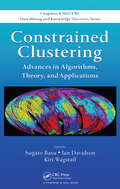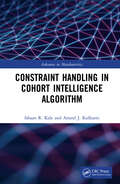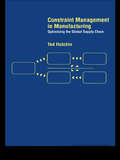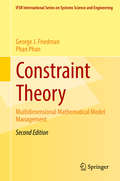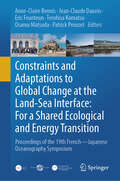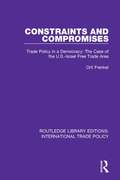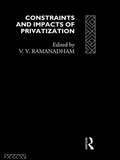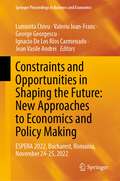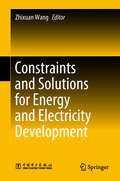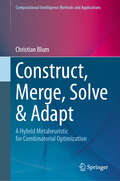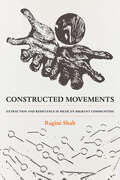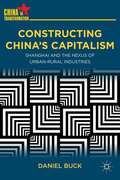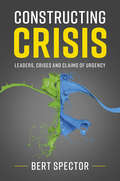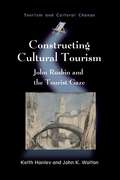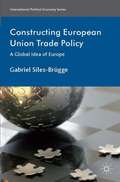- Table View
- List View
Constitutional Money
by Richard H. TimberlakeThis book reviews nine Supreme Court cases and decisions that dealt with monetary laws and gives a summary history of monetary events and policies as they were affected by the Court's decisions. Several cases and decisions had notable consequences on the monetary history of the United States, some of which were blatant misjudgments stimulated by political pressures. The cases included in this book begin with McCulloch v. Maryland in 1819 and end with the Gold Clause Cases in 1934–5. Constitutional Money examines three institutions that were prominent in these decisions: the Supreme Court, the gold standard and the Federal Reserve System. The final chapter describes the adjustments necessary to return to a gold standard and briefly examines the constitutional alternatives.
Constitutional Mythologies: New Perspectives on Controlling the State (Studies in Public Choice #23)
by Alain MarcianoOur societies obviously rest on common beliefs. These "myths" are tools that help us to develop and build common identities; they form the structure around which societies function. This does not imply that these beliefs are "true," in the sense that they would be supported by empirical facts. In social matters, myths have undoubtedly important functions to play even if no empirical facts support them. On the other hand, and precisely because they are not discussed, myths may be problematic: they may create illusions, conserve structures that are inefficient and unable to improve the situation of citizens. This is particularly true with constitutions. Constitutions are very important for societies: a constitution is a document -- even in societies based on "unwritten" constitutions -- which binds citizens together, creating unity among them, and which forms the framework within which our activities take place. As Nobel Prize laureate James Buchanan used to say: constitutions contain the rules of the social game we play in our everyday life. However, constitutions are not frequently debated by citizens. This is why we end up with common beliefs about these constitutions: they are above our heads, around us. We take them, their role, function, and nature as given. The purpose of this volume to investigate and challenge common constitutional myths. Featuring contributions from prominent economists, political scientists, and legal scholars, the chapters in this volume address such myths as "constitutions are binding social contracts," "constitutions are economic documents" and "constitutions are legal documents." Illustrating their analyses with historical and contemporary examples from the United States, Canada, and Europe, the authors build a multi-layered approach to understanding constitutions and their implications for social and political influence.
Constitutionalism Under Extreme Conditions: Law, Emergency, Exception (Ius Gentium: Comparative Perspectives on Law and Justice #82)
by Richard Albert Yaniv RoznaiThis book examines the problem of constitutional change in times of crisis. Divided into five main parts, it both explores and interrogates how public law manages change in periods of extraordinary pressure on the constitution. In Part I, “Emergency, Exception and Normalcy,” the contributors discuss the practices and methods that could be used to help legitimize the use of emergency powers without compromising the constitutional principles that were created during a period of normalcy. In Part II, “Terrorism and Warfare,” the contributors assess how constitutions are interpreted during times of war, focusing on the tension between individual rights and safety. Part III, “Public Health, Financial and Economic Crises,” considers how constitutions change in response to crises that are neither political in the conventional sense nor violent, which also complicates how we evaluate constitutional resilience in times of stress. Part IV, “Constitutionalism for Divided Societies,” then investigates the pressure on constitutions designed to govern diverse, multi-national populations, and how constitutional structures can facilitate stability and balance in these states. Part V, titled “Constitution-Making and Constitutional Change,” highlights how constitutions are transformed or created anew during periods of tension. The book concludes with a rich contextual discussion of the pressing challenges facing constitutions in moments of extreme pressure. Chapter “Public Health Emergencies and Constitutionalism Before COVID-19: Between the National and the International” is available open access under a Creative Commons Attribution 4.0 International License via link.springer.com.
Constitutionalism and Society in Africa (Contemporary Perspectives on Developing Societies)
by Okon AkibaThe issues addressed in this rewarding book provide new insight into the way we conceive, reflect and study the problems of political transformation and constitution-making in Africa. The study provides a refreshingly in-depth analysis of the strengths and weaknesses of constitutional provisions for managing the challenges of race, religion, ethnicity, citizenship, civil liberties and civil-military relations in Africa's transitional democracies. Tracing emerging trends in constitution-making, it blends the theory of constitutional democracy with case studies, and defines the imperative of social justice.
Constitutionalism and the Politics of Accommodation in Multinational Democracies (St Antony's Series)
by Jaime LluchThis collection argues that although constitutionalism has traditionally been the primary mechanism for facilitating the mutual accommodation of sub-state and state national societies in plurinational states.
Constitutions of Value: Law, Governance, and Political Ecology
by Isabel Feichtner and Geoff GordonGathering an interdisciplinary range of cutting-edge scholars, this book addresses legal constitutions of value. Global value production and transnational value practices that rely on exploitation and extraction have left us with toxic commons and a damaged planet. Against this situation, the book examines law’s fundamental role in institutions of value production and valuation. Utilising pathbreaking theoretical approaches, it problematizes mainstream efforts to redeem institutions of value production by recoupling them with progressive values. Aiming beyond radical critique, the book opens up the possibility of imagining and enacting new and different value practices. This wide-ranging and accessible book will appeal to international lawyers, socio-legal scholars, those working at the intersections of law and economy and others, in politics, economics, environmental studies and elsewhere, who are concerned with rethinking our current ideas of what has value, what does not, and whether and how value may be revalued.
Constrained Clustering: Advances in Algorithms, Theory, and Applications (Chapman & Hall/CRC Data Mining and Knowledge Discovery Series)
by Ian MuehlenhausThis volume encompasses many new types of constraints and clustering methods as well as delivers thorough coverage of the capabilities and limitations of constrained clustering. With contributions from industrial researchers and leading academic experts who pioneered the field, it provides a well-balanced combination of theoretical advances, key algorithmic development, and novel applications. The book presents various types of constraints for clustering and describes useful variations of the standard problem of clustering under constraints. It also demonstrates the application of clustering with constraints to relational, bibliographic, and video data.
Constrained Discretion: Bernanke's Quest for an Inflation Target
by Ethan S. HarrisOne of the hot topics in monetary economics is whether policy makers should be constrained by rules or use discretion. Advocates of discretion argue that the Fed should react to developments in the economy using its best judgment at the time. By contrast, rules advocates argue that policy makers are not very adept at managing the economy, that they are influenced by politicians, and that they may pursue policies that boost economic performance in the short term at the expense of long-term economic stability. This chapter examines the new Fed chairman's position on the matter.
Constraint Handling in Cohort Intelligence Algorithm (Advances in Metaheuristics)
by Anand J. Kulkarni Ishaan R. KaleMechanical Engineering domain problems are generally complex, consisting of different design variables and constraints. These problems may not be solved using gradient-based optimization techniques. The stochastic nature-inspired optimization techniques have been proposed in this book to efficiently handle the complex problems. The nature-inspired algorithms are classified as bio-inspired, swarm, and physics/chemical-based algorithms. Socio-inspired is one of the subdomains of bio-inspired algorithms, and Cohort Intelligence (CI) models the social tendencies of learning candidates with an inherent goal to achieve the best possible position. In this book, CI is investigated by solving ten discrete variable truss structural problems, eleven mixed variable design engineering problems, seventeen linear and nonlinear constrained test problems and two real-world applications from manufacturing domain. Static Penalty Function (SPF) is also adopted to handle the linear and nonlinear constraints, and limitations in CI and SPF approaches are examined. Constraint Handling in Cohort Intelligence Algorithm is a valuable reference to practitioners working in the industry as well as to students and researchers in the area of optimization methods.
Constraint Management in Manufacturing: Optimising the Supply Chain
by Ted HutchinFocusing on making money out of the supply chain, this book describes how to successfully manage manufacturing companies in today's global context. The text explores how constraint management, with roots in the Theory of Constraints, produces wealth through the development of manufacturers' strengths. Constraint Management in Manufacturing:
Constraint Theory: Multidimensional Mathematical Model Management (IFSR International Series in Systems Science and Systems Engineering #23)
by George J. Friedman Phan PhanAt first glance, this might appear to be a book on mathematics, but it is really intended for the practical engineer who wishes to gain greater control of the multidimensional mathematical models which are increasingly an important part of his environment. Another feature of the book is that it attempts to balance left- and right-brain perceptions; the author has noticed that many graph theory books are disturbingly light on actual topological pictures of their material. One thing that this book is not is a depiction of the Theory of Constraints, as defined by Eliyahu Goldratt in the 1980's. Constraint Theory was originally defined by the author in his PhD dissertation in 1967 and subsequent papers written over the following decade. It strives to employ more of a mathematical foundation to complexity than the Theory of Constraints. This merely attempts to differentiate this book from Goldratt's work, not demean his efforts. After all, the main body of work in the field of 1 Systems Engineering is still largely qualitative .
Constraints and Adaptations to Global Change at the Land-Sea Interface: Proceedings of the 19th French—Japanese Oceanography Symposium
by Patrick Prouzet Teruhisa Komatsu Eric Feunteun Anne-Claire Bennis Jean-Claude Dauvin Osamu MatsudaCoastal or semi-enclosed seas, coastal or interface zones between land and sea are areas widely coveted by numerous human activities. These activities do not assess the effects and impacts of their cumulative pressures on the natural environment: coastal development, tourism, terrestrial pollution, maritime transport, dredging and piling, extraction of marine aggregates and development or planned development of marine wind farms or tidal turbines. In this context and despite the high productivity of these ecosystems, fishing and shellfish farming, which also exert their own environmental pressures, have some difficulties in ensuring their sustainability in an increasingly man-made environment and generating increasingly exacerbated conflicts of use. The symposium will address some aspects of resilience (via their capacity to adapt to global change) of these coastal ecosystems and adaptation of human communities to climate change in a context of full use of natural resources. A more holistic approach to the impact of all uses on the environment to ensure a more optimal management of the Commons, needs to be implemented. In Japan, the concept of Sato-umi (harmony between the coastal sea and local communities) is being implemented and incorporates participatory science and active restoration projects in an integrated coastal zone management framework.
Constraints and Compromises: Trade Policy in a Democracy: The Case of the U.S.-Israel Free Trade Area (Routledge Library Editions: International Trade Policy #6)
by Orit FrenkelThe negotiation of the Free Trade Area between the US and Israel was, at the time, a remarkable political accomplishment, and is a useful case study because it includes all of the industrial and agricultural sectors, thus spanning the full spectrum of issues that would be dealt with in negotiations. In addition, it has the advantage of involving just two countries and lasting only fifteen months from start to finish, facilitating a comprehensive analysis. This book, first published in 1990, provides a valuable analysis of this vital case study of an FTA from commencement to completion.
Constraints and Impacts of Privatisation
by V. V. RamanadhamThis book contains papers on some 25 countries written by experts directly connected with privatisation, either as academics or as policy makers and practitioners, with a comparative review at the end by the editor. It highlights the major factors in the success and the failings of privatisation attempts in different countries in Europe, America, Latin America, Africa, Asia and Australasia. In particular there are studies on the evolving experience of transformation to free market economy in the former socialist countries of Eastern Europe.
Constraints and Opportunities in Shaping the Future: ESPERA 2022, Bucharest, Romania, November 24-25, 2022 (Springer Proceedings in Business and Economics)
by George Georgescu Jean Vasile Andrei Luminita Chivu Ignacio De Los Ríos Carmenado Valeriu Ioan-FrancThis book explores multifaceted dimensions of economic crisis management including strategies and trends post-crisis. It examines the constraints and opportunities shaping the future of economics, social science and policy making, providing various economic models and paradigms. Featuring the best papers presented at the 2022 International Conference of Economic Scientific Research - Theoretical, Empirical and Practical Approaches (ESPERA), this book explores topics of highest interest such as energy crisis, inflation, fiscal and monetary policy, food security, safety and sustainability, the future of work, global financial systems, sovereign debt sustainability, digital currencies, supply chain disruptions, and cybersecurity, among others. Through the discussion of these topics, this book bridges the gap between theory and practice in economic crisis management and it is useful for scholars, researchers, academics, and policymakers.
Constraints and Solutions for Energy and Electricity Development
by Zhixuan WangThis book primarily focuses on constraints and solutions for energy and electric power development. On the basis of analyses, proposes a planning index system including 26 binding indicators and the breaking constraints measures. Offering significant insights and proposals concerning the current status of energy development and the key limiting factors to sustainable energy development in China, it is a valuable resource for policy-makers, managers and researchers in the energy sector.
Constraints on Growth in the MENA Region
by Rina Bhattacharya Hirut WoldeA report from the International Monetary Fund.
Constraints on Trade in the MENA Region
by Rina Bhattacharya Hirut WoldeA report from the International Monetary Fund.
Construct, Merge, Solve & Adapt: A Hybrid Metaheuristic for Combinatorial Optimization (Computational Intelligence Methods and Applications)
by Christian BlumThis book describes a general hybrid metaheuristic for combinatorial optimization labeled Construct, Merge, Solve & Adapt (CMSA). The general idea of standard CMSA is the following one. At each iteration, a number of valid solutions to the tackled problem instance are generated in a probabilistic way. Hereby, each of these solutions is composed of a set of solution components. The components found in the generated solutions are then added to an initially empty sub-instance. Next, an exact solver is applied in order to compute the best solution of the sub-instance, which is then used to update the sub-instance provided as input for the next iteration. In this way, the power of exact solvers can be exploited for solving problem instances much too large for a standalone application of the solver. Important research lines on CMSA from recent years are covered in this book. After an introductory chapter about standard CMSA, subsequent chapters cover a self-adaptive CMSA variant as well as a variant equipped with a learning component for improving the quality of the generated solutions over time. Furthermore, on outlining the advantages of using set-covering-based integer linear programming models for sub-instance solving, the author shows how to apply CMSA to problems naturally modelled by non-binary integer linear programming models. The book concludes with a chapter on topics such as the development of a problem-agnostic CMSA and the relation between large neighborhood search and CMSA. Combinatorial optimization problems used in the book as test cases include the minimum dominating set problem, the variable-sized bin packing problem, and an electric vehicle routing problem. The book will be valuable and is intended for researchers, professionals and graduate students working in a wide range of fields, such as combinatorial optimization, algorithmics, metaheuristics, mathematical modeling, evolutionary computing, operations research, artificial intelligence, or statistics.
Constructed Movements: Extraction and Resistance in Mexican Migrant Communities (Race, Labor Migration, and the Law #1)
by Ragini ShahA free ebook version of this title is available through Luminos, University of California Press's Open Access publishing program. Visit www.luminosoa.org to learn more. At once theoretically sophisticated and poignantly written, Constructed Movements centers stories from communities in Mexico profoundly affected by emigration to the United States to show how migration extracts resources along racial lines. Ragini Shah chronicles how three interrelated dynamics—the maldistribution of public resources, the exploitation of migrant labor, and the US immigration enforcement regime—entrench the necessity of migration as a strategy for survival in Mexico. She also highlights the alternative visions elaborated by migrant community organizations that seek to end the conditions that force migration. Recognizing that reform without recompense will never right an unjust migratory system, Shah concludes with a forceful call for the US and Mexican governments to make abolitionist investments and reparative compensation to directly counteract this legacy of extraction.
Constructing China’s Capitalism
by Daniel BuckBy investigating the nexus of relationships between urban and rural factories in the Shanghai region of China, this book shines light on an overlooked part of China's massive industrial growth since the 1980s.
Constructing Crisis: Leaders, Crises and Claims of Urgency
by Bert SpectorThere is no such thing as a crisis. Rather than an actual, corporeal thing, a crisis is a claim asserted from a position of power and influence, intended to shape the understanding of others. A constructed crisis by a leader may or may not be legitimate, and, legitimate or not, the content of a claim alone does not determine whether people decide to believe it. Rather than viewing crises as the result of objective events, Spector demonstrates that leaders impose crises on organizations to strategically assert power and exert control. Interpreting crisis through a critical lens, this interdisciplinary book encompasses not just management and organizational literature, but also sociology, history, cognitive science, and psychology. The resulting wide-ranging, critical, and provocative analysis will appeal in particular to students and academics researching leadership and crisis management.
Constructing Cultural Tourism
by John K. Walton Keith HanleyThis book is an interdisciplinary collaboration between a literary critic and cultural historian, which examines and recovers a radical and still urgent challenge to the industrialisation of cultural tourism from the work of John Ruskin. Ruskin exerted a formative influence on the definition and development of cultural tourism which was probably as significant as that, for example, of his contemporary Thomas Cook. The book assesses Ruskin's overall influence on the development of national and international tourism in the context of pre-existing expectations about tourism flows and cultural capital and alongside parallel and intersecting trends of the time; examines Ruskin's contribution to the tourist agenda at all social levels; and discusses Ruskin's significance for current debates in tourism studies, especially questions of the place of the 'canon' of traditional European cultural tourism in a post-modern tourist setting, and the various incarnations of 'heritage tourism'.
Constructing European Union Trade Policy: A Global Idea of Europe (International Political Economy Series)
by Gabriel Siles-BrüggeWith the stagnation of the Doha Round of multilateral talks, trade liberalisation is increasingly undertaken through free trade agreements. Gabriel Siles-Brügge examines the EU's decision – following the 2006 'Global Europe' strategy – to negotiate such agreements with emerging economies. Eschewing the purely materialist explanations prominent in the field, he develops a novel constructivist argument to highlight the role of language and ideas in shaping EU trade policy. Drawing on extensive interviews and documentary analysis, Siles-Brügge shows how EU trade policymakers have privileged the interests of exporters to the detriment of import-competing groups, creating an ideational imperative for market-opening. Even during the on-going economic crisis the overriding mantra has been that the EU's future well-being depends on its ability to compete in global markets. The increasingly neoliberal orientation of EU trade policy has also had important consequences for its economic diplomacy with the developing economies of the African, Caribbean and Pacific group of states.
Constructing Forecast Confidence Bands During the Financial Crisis
by Douglas Laxton Marianne Johnson Ondra Kamenik Huigang Chen Kevin ClintonA report from the International Monetary Fund.

